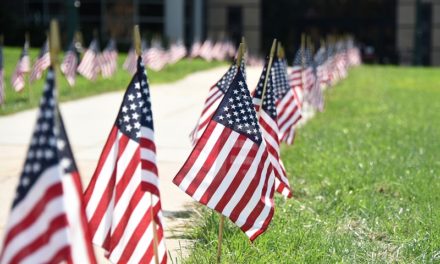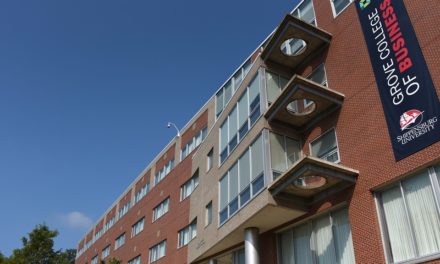The COVID-19 pandemic has rocked the nation. Schools have closed. Businesses have shuttered. In many cases, there are more questions than answers. The Shippensburg community is no exception.
Enter the Shippensburg Community Resource Coalition (SCRC).
“The SCRC helps to bring resources together and support the Shippensburg community in this time of need. We are aware that this crisis has brought on new problems for many people, and are working to collaborate with local organizations, agencies, and religious groups to provide the help and resources Shippensburg residents need to thrive during this difficult time,” social work major and SCRC intern Joey Loffio said.
SCRC was started in 2012 as a community-university partnership based out of Ship’s Social Work and Gerontology Department. The collaboration provides Ship students from all areas of study with hands-on opportunities to serve the community through different programs that also include the Teen Leadership Club and Healthy Decisions Group.
With schools closed as part of Pennsylvania’s effort to slow the spread of coronavirus, there are plenty of concerns about local children’s access to meals. Assisting with food insecurity is nothing new for SCRC. In fact, the group’s Summer Lunch Program provides free meals to Shippensburg children for seven weeks during the summer. The Hound Packs program provides food insecure students in the Shippensburg Area School District with seven meals and snacks over the weekend. Last year, there were 20,000 weekend meals provided through Hound Packs.
In response to the pandemic, the coalition is hosting weekly community conference calls focused on meeting the needs of Shippensburg residents, especially students and families that are food insecure.
“One of the main concerns is how to get meals to children who live on the edge of town and in the more rural areas of the district. While the school district is taking the lead on regular breakfasts and lunches, we are working to help support their efforts and continue to provide Hound Packs,” Sonja Payne, the community health mobilizer, said.
While social distancing continues during the pandemic, so does the work of Ship students involved with SCRC. Food distribution has been modified to keep volunteers and participants as safe as possible. Shippensburg Produce and Outreach, for example, is asking participants to pick up their food in a drive-thru style. Intake is being handled in a one-on-one manner while those involved remain three or more feet away. Interns are able to work remotely as well, organizing efforts to bring awareness to resources digitally.
Businesses in the community are helping to provide free meals to students during certain times of the week. Local pantries are also continuing to distribute food. This is information that SCRC is collecting and sharing on social media. Plus, the coalition is helping to connect programs that need support, whether remotely or in person, with those who are able to help.
“One of the unique things that SCRC offers is helping to mobilize the many wonderful resources we already have in the area. Many organizations have to focus their time almost solely on what they are doing to provide services, while SCRC, as a coalition, can help to collect and distribute information so that we are doing our best, as a community, to maximize resources and provide the most help possible,” Fisher said.
While being there for the community right now is a major focus for SCRC, long-term work is continuing as well. Research and grant writing are major projects for the coalition. SCRC received two grants in the fall. One, totaling $103,839, was awarded by the Pennsylvania Commission on Crime and Delinquency to aid the coalition in continuing its work in establishing a Communities That Care center. The other grant, awarded by the Partnership for Better Health via the Shippensburg University Foundation, provided $64,200 to support the Healthy Shippensburg project.
SCRC currently has a fundraising campaign with the Partnership for Better Health called Match Madness. Donations made during the month of March will be matched. The first $1,000 will be matched in full and the remaining donations will be matched through a stretch fund. Donations are going toward SCRC’s Summer Lunch Program. While the current situation has not stopped this remote fundraiser, Fisher says efforts to promote the campaign have been hindered since the group is busy collaborating with the community to provide aid where it is needed. A silent auction organized as part of the campaign did not go on as scheduled, but Fisher is hopeful it will be rescheduled as an online auction soon.
Both now and in the future, the coalition is always happy to take on any help it can get.
“Practicing social distancing and preventative behaviors to reduce the spread of the virus is key. However, community members that are not high risk (immunocompromised or 70+ years old) could be used as volunteers as many of the community’s volunteers are in the high-risk categories. The free community meals have adjusted their meals to be boxed grab-and-go meals, but many of the volunteers are retirees and at high risk of contracting the virus,” Payne said.
Another way to assist is to donate non-perishable food and household or personal supplies. SCRC can connect those interested in donating with churches or local food pantries.
“Once social distancing is a thing of the past, we would appreciate volunteers to continue to help out even when the (high-risk volunteers) are able to return to work. Many of the programs in our community are being run by the same volunteers year after year. Some of the volunteers at Christ Among Neighbors have volunteered for over twenty years and would appreciate some new volunteers. Our Summer Lunch Program is always looking for volunteers, too. We have grown exponentially in the past three years and, in order to keep the program free, we can only do that with volunteers. As the economy grows, donations to keep the many programs in the community free or low cost are helpful,” Payne said.
Organizations or programs with projects, whether remote or requiring direct volunteers, can connect with SCRC by first completing an online form.
Anyone interested in volunteering can email sp-scrc@shipresources.org.
More information about the Shippensburg Community Resource Coalition, how to get involved and the services it provides are available at shipresources.org.



